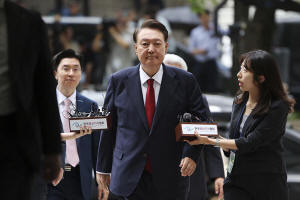South Korean court approves new arrest of former President Yoon Suk Yeol
over martial law decree
[July 10, 2025]
By KIM TONG-HYUNG
SEOUL, South Korea (AP) — A South Korean court early Thursday approved
the new arrest of former President Yoon Suk Yeol on charges related to
his brief imposition of martial law in December, accepting a special
prosecutor’s claim that he poses a risk of destroying evidence.
The arrest warrant issued by the Seoul Central District Court sent Yoon
back to a detention center near the capital, four months after his
release in March, when the same court overturned his January arrest and
allowed him to stand trial for rebellion without being held in custody.
His criminal case is being handled by a team of investigators under
special prosecutor Cho Eun-suk who are pursuing additional charges over
Yoon’s authoritarian push, including obstructing official duties, abuse
of power and falsifying official documents.
Cho’s team questioned him twice before submitting a request for his
arrest warrant to the court on Sunday.
Yoon’s lawyers had described the arrest request as excessive and
unsubstantiated. They didn’t immediately react to the court’s decision
to approve the arrest of Yoon , who was formally removed from office in
April after the Constitutional Court upheld his impeachment.

Yoon didn’t respond to questions by reporters after arriving at the
court on Wednesday afternoon for a hearing to review the special
prosecutor’s request. After the hearing lasting about seven hours, Yoon
was taken to the detention center to await the court’s decision.
Yoon’s new arrest could mark the beginning of an extended period in
custody, potentially lasting months or longer. Yoon can be initially
detained at the center for up to 20 days, while the special prosecutor
will aim to indict him on additional charges.
If Yoon is indicted on new charges, that could keep him under arrest for
up to six months until an initial court ruling. If that court convicts
him and issues a prison term, Yoon would serve that sentence as the case
possibly moves up to higher courts.
Park Ji-young, a senior investigator on Cho’s team, said they plan to
question Yoon again Friday. Yoon was absent from a Thursday hearing at
the Seoul court over his earlier indictment on rebellion charges, and
his lawyers offered no immediate explanation for his absence.
[to top of second column]
|

Former South Korean President Yoon Suk Yeol, centerm arrives at a
court to attend a hearing to review his arrest warrant requested by
special prosecutors in Seoul, South Korea Wednesday, July 9, 2025.
(Kim Hong-Ji/Pool Photo via AP)

The former conservative leader described his martial law imposition
on Dec. 3 as a necessary step to quash his “anti-state” liberal
opponents, accusing them of using their legislative majority to
obstruct his agenda. But Yoon’s decree lasted only hours, after a
quorum of lawmakers broke through a blockade of heavily armed
soldiers at the National Assembly and voted to lift the measure.
Yoon was impeached by lawmakers Dec. 14 and indicted Jan. 26 by
public prosecutors who accused him of masterminding an attempted
rebellion, describing his power grab as an illegal attempt to seize
the legislature and election offices and detain political opponents.
The charges are punishable by the death penalty or life
imprisonment.
Yoon also faces accusations of enforcing martial law without
following required legal procedure, such as deliberation by a formal
Cabinet meeting, and of unlawfully deploying the presidential
security forces like a private army to block an initial attempt by
law enforcement to detain him at his residence in early January.
His liberal rival and current President Lee Jae Myung, who won the
June snap election to replace him, last month approved legislation
to launch sweeping special investigations into Yoon’s martial law
debacle and other criminal allegations involving his wife and
administration.
All contents © copyright 2025 Associated Press. All rights reserved
 |